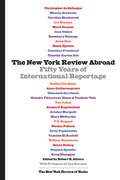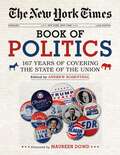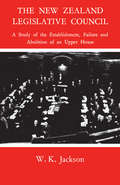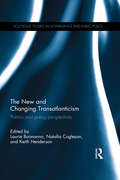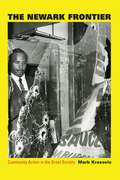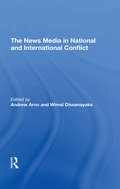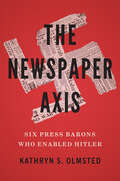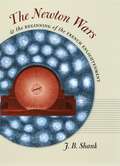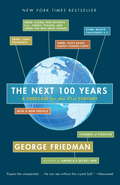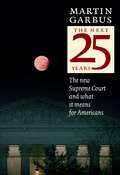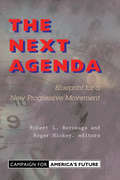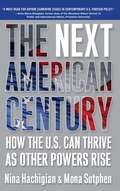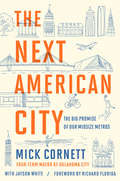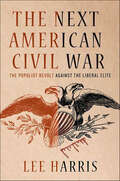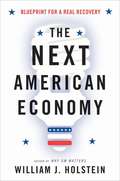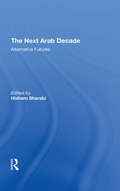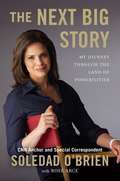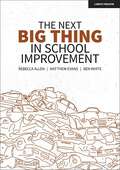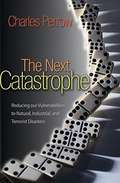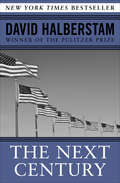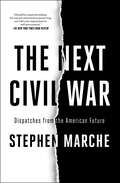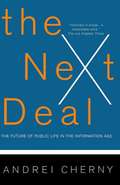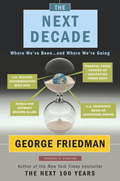- Table View
- List View
The New York Review Abroad: Fifty Years of International Reportage
by Ian Buruma Robert B. SilversFor the past fifty years, The New York Review of Books has covered virtually every international revolution and movement of consequence by dispatching the world's most brilliant writers to write eyewitness accounts. The New York Review Abroad not only brings together twenty-eight of the most riveting of these pieces but includes epilogues that update and reassess the political situation (by either the original authors or by Ian Buruma). Among the pieces included are: * Susan Sontag's personal narrative of staging Waiting for Godot in war-torn Sarajevo * Alma Guillermoprieto's report from inside Colombia's guerrilla headquarters and her disturbing encounter with young female fighters * Ryszard Kapuscinski's terrifying description of being set on fire while running roadblocks in Nigeria * Caroline Blackwood's coverage of the 1979 gravediggers' strike in Liverpool--a noir mini-masterpiece * Timothy Garton Ash's minute-by-minute account from the Magic Lantern theater in Prague in 1989, where the subterranean stage, auditorium, foyers, and dressing rooms had become the headquarters of the revolution Among other writers whose New York Review pieces will be included are Tim Judah, Amos Elon, Joan Didion, William Shawcross, Christopher de Bellaigue, and Mark Danner. A tour de force of vivid and enlightening writing from the front lines, this volume is indeed the first rough draft of the history of the past fifty years.
The New York Times Book of Politics: 167 Years of Covering the State of the Union
by Andrew RosenthalFor 167 years, The New York Times has been in the forefront of political reporting—from memorable campaigns and elections to controversial legislation, scandals, and issues ranging from immigration, race, and gender to the economy and war.In today&’s turbulent times, the newspaper&’s political coverage is more relevant than ever; not only for the news itself, but because of the paper&’s leadership in defending the freedom of the press.Compiled by noted New York Times editor Andrew Rosenthal, this anthology explores the newspaper&’s broad scope of unparalleled political coverage and examines what has changed over the decades and what remains the same. Covering stories from 1856 to 2018, it features presidential milestones: the astounding 1860 triumph of Republicanism with Abraham Lincoln&’s election and Senator Barack Obama&’s 2008 presidential victory as racial barriers seemed, perhaps prematurely, to fall. Wars: the start of the atomic age, the fall of Saigon, the conflict in Iraq. Important legal issues like the ratification of the 19th amendment in 1920, the 2000 Florida presidential recount, and same-sex marriage. The course of the country&’s economy, such as the 2008 financial disaster and President Donald Trump&’s tax overhaul. Momentous protests, like the 1963 March for Civil Rights, Kent State, the takeover of Wounded Knee, Black Lives Matter, and the MeToo movement. Political scandals and investigations, from Watergate to the firing of F.B.I. director James B. Comey. And so much more.With 60 photographs as well as reproductions of front-page stories, here are the noteworthy political articles from The New York Times archives that are sure to engross readers.Included are stories on tumultuous campaigns and surprising elections, scandals that rocked the world, the waging of war—from &“good&” wars (World Wars I and II) to &“bad&” wars (Vietnam), groundbreaking legislation, important protests, and hot button issues like feminism, LGBTQ rights, and DACA. The 81 articles include:&“Demands Oil Regulation—La Follette Committee Suggests 8 Immediate Remedies&” (March 5, 1923)&“Welch Assails McCarthy&’s &‘Cruelty&’ and &‘Recklessness&’ in Attack on Aide&”—W. H. Lawrence (June 10, 1954)&“Vietnam: The Signs of Stalemate&”—R. W. Apple Jr. (August 7, 1967)Goal Is Harmony—President-Elect [Nixon] Vows His Administration Will Be &“Open&”—Robert B. Semple Jr. (November 7, 1968)&“Senators Bar Weakening of Equal Rights Proposal&”—Eileen Shanahan (March 22, 1972)&“Goldwater Vows to Fight Tactics of &‘New Right&’&”—Judith Miller (September 16, 1981)&“Raze Berlin Wall, Reagan Urges Soviet&”—Gerald M. Boyd (June 13, 1987)&“Riots in Los Angeles: The Blue Line&”—(May 1, 1992)&“Bush Lets U.S. Spy on Callers without Courts&”—James Risen and Eric Lichtblau (December 16, 2005)&“Senate Repeals Ban Against Openly Gay Military Personnel&”—Carl Hulse (December 18, 2010)&“Donald Trump Is Elected President in Stunning Repudiation of the Establishment&”—Matt Flegenheimer and Michael Barbaro (November 9, 2016)&“How G.O.P. Leaders Came to View Climate Change as Fake Science&”—Coral Davenport and Eric Lipton (June 3, 2017)&“After 16 Futile Years Congress Will Try Again to Legalize &‘Dreamers&’&”—Yamiche Alcindor and Sheryl Gay Stolberg (September 5, 2017)
The New Zealand Legislative Council: A Study of the Establishment, Failure and Abolition of an Upper House
by William JacksonThe New Zealand upper house, the Legislative Council (which bore a marked resemblance to its Canadian counterpart the Federal Senate) was abolished in 1950 in an action which represents one of the most clear-cut examples of pragmatic politics in New Zealand history. It was abolished by the essentially conservative National party (fundamentally committed to the bicameral principle), while the Labour party (formally committed to abolition) at first obstructed and then merely stood on the sidelines. New Zealand thus became the only democratic country in the world without either an upper house or a formal written constitution of any consequence. The author attempts both to explain this unusual development and to assess its consequences. The generally accepted view that the Legislative Council failed in 1892 is challenged, and the causes of the decline and failure are traced back to circumstances surrounding its original establishment in 1854. Subsequently, developments since 1950 are examined in the light of abolition. The author concludes that abolition represented the right policy undertaken for the wrong reasons and that ultimately it has made a greater contribution to constitutional change in the twenty years since 1950 than the chamber itself made in the last fifty years of its existence. The New Zealand Legislative Council, an analytical historical study of an institution, throws valuable light on the strengths and weaknesses of the bicameral principle and the consequences of abolishing a second chamber of Parliament. The book should prove useful to Political Science and History courses dealing with Commonwealth Parliamentary government, comparative institutions and constitutional law. It should also appeal to all those interested in the question of bicameral representation.
The New and Changing Transatlanticism: Politics and Policy Perspectives (Routledge Studies in Governance and Public Policy #19)
by Keith Henderson Laurie Buonanno Natalia CuglesanThe European Union and the US are currently negotiating the Transatlantic Trade and Investment Partnership (TTIP), with potentially enormous economic gains for both partners. Experts from the European Union and the US explore not only the groundwork laid for TTIP under the "New Transatlanticism," but also the key variables – economic, cultural, institutional, and political – shaping transatlantic policy outcomes. Divided into four parts, Part I, consisting of three chapters, contextualizes the transatlantic relationship with an historical survey, contemporary foreign relations and policy, and cultural dynamics. Together, these chapters provide the background for understanding the evolving nature of the EU–US relationship. Part II of this volume focuses on governance and comprises two chapters – one on transatlantic governance and the other administrative culture. Part III consists of six policy chapters: competition, trade, transport, mobility regimes, financial services regulation, and GMOs. Part IV, consisting of three chapters, explores prospects and challenges associated with transatlanticism, including the TTIP. The last chapter concludes with lessons learned and future challenges with respect to policy convergence; the nature of the EU–US relationship; power, resources, and bargaining within the transatlantic partnership; and, an assessment of the future of deeper cooperation and integration. This insightful account into policy cooperation between the EU and the US is a welcomed resource for policy specialists oriented toward comparative public policy wishing to enter the arena of Transatlantic Studies.
The Newark Frontier: Community Action in the Great Society
by Mark KrasovicTo many, Newark seems a profound symbol of postwar liberalism's failings: an impoverished, deeply divided city where commitments to integration and widespread economic security went up in flames during the 1967 riots. While it's true that these failings shaped Newark's postwar landscape and economy, as Mark Krasovic shows, that is far from the whole story. The Newark Frontier shows how, during the Great Society, urban liberalism adapted and grew, defining itself less by centralized programs and ideals than by administrative innovation and the small-scale, personal interactions generated by community action programs, investigative commissions, and police-community relations projects. Paying particular attention to the fine-grained experiences of Newark residents, Krasovic reveals that this liberalism was rooted in an ethic of experimentation and local knowledge. He illustrates this with stories of innovation within government offices, the dynamic encounters between local activists and state agencies, and the unlikely alliances among nominal enemies. Krasovic makes clear that postwar liberalism's eventual fate had as much to do with the experiments waged in Newark as it did with the violence that rocked the city in the summer of 1967.
The News Media In National And International Conflict
by Wimal Dissanayake Andrew ArnoIronically, as telecommunications technology—the embodiment of modernity—advances, bringing people in different nations into more direct contact during conflict situations, traditional cultural factors become increasingly important as differing ways of thinking and acting collide. The mass media can be seen as a factor in the creation of international conflict; they also, claim many scholars, are the key to control and resolution of those problems. Whichever side of the coin one chooses to look at—mass communication as cause or cure of conflict—there is no doubt that the news media are no longer peripheral players on the global scene; they are important participants whose organizational patterns of behavior, values, and motivations must be taken into account in understanding national and international conflict. In this volume, a distinguished group of authors explores the variety of ways the news media—newspapers, radio, and television—are involved in conflict situations. Conflicts between the United States and Iran, India and Pakistan, and the United States and China are examined, and national-level studies in Sri Lanka, Iran, Hong Kong, and the United States provide varied contexts in which the authors look at the complex interrelationships among government, news media, and the public in conflict situations.
The Newsmakers Collection: The Newsmakers, The Candidate, The Separatists (A Newsmakers Novel)
by Lis Wiehl Sebastian StuartThe NewsmakersTV reporter Erica Sparks has become a superstar overnight. Is it due to her hard work and talent, or is she at the center of a spiraling conspiracy?On her very first assignment, Erica inadvertently witnesses—and films—a horrific tragedy, scooping all the other networks. Mere weeks later, another tragedy strikes—again, right in front of Erica and her cameras.Erica will stop at nothing to uncover the truth. But she has to make sure disaster—and her troubled past—don’t catch up with her first.The CandidateHow far will a candidate go to become president? Erica Sparks—America’s top-rated cable-news host—is about to find out.Mike Ortiz is a dynamic war hero favored to win the White House. Standing by his side is his glamorous and adoring wife, Celeste. But something about this seemingly perfect couple troubles Erica.The Candidate is packed with political intrigue and media manipulation as the lust for power turns deadly indeed.The SeparatistsAfter getting the green light from her network to launch an investigative news show, Erica flies to Bismarck, North Dakota, to investigate Take Back Our Homeland, the largest secessionist group. What she finds is profoundly disturbing—a growing threat to the future of our union.Then she discovers a potential informant murdered in her Bismarck hotel. Take Back Our Homeland might be even more dangerous than she had thought—and she’s unwittingly become one of the key players in the story. Her fear and anxiety escalate—for her marriage, her daughter, and her own life.
The Newspaper Axis: Six Press Barons Who Enabled Hitler
by Kathryn S. OlmstedHow six conservative media moguls hindered America and Britain from entering World War II &“A landmark in the political history of journalism.&”—Michael Kazin, author of What It Took to Win: A History of the Democratic Party As World War II approached, the six most powerful media moguls in America and Britain tried to pressure their countries to ignore the fascist threat. The media empires of Robert McCormick, Joseph and Eleanor Patterson, and William Randolph Hearst spanned the United States, reaching tens of millions of Americans in print and over the airwaves with their isolationist views. Meanwhile in England, Lord Rothermere&’s Daily Mail extolled Hitler&’s leadership and Lord Beaverbrook&’s Daily Express insisted that Britain had no interest in defending Hitler&’s victims on the continent. Kathryn S. Olmsted shows how these media titans worked in concert—including sharing editorial pieces and coordinating their responses to events—to influence public opinion in a right-wing populist direction, how they echoed fascist and anti‑Semitic propaganda, and how they weakened and delayed both Britain&’s and America&’s response to Nazi aggression.
The Newton Wars and the Beginning of the French Enlightenment
by J. B. ShankNothing is considered more natural than the connection between Isaac Newton's science and the modernity that came into being during the eighteenth-century Enlightenment. Terms like "Newtonianism" are routinely taken as synonyms for "Enlightenment" and "modern" thought, yet the particular conjunction of these terms has a history full of accidents and contingencies. Modern physics, for example, was not the determined result of the rational unfolding of Newton's scientific work in the eighteenth century, nor was the Enlightenment the natural and inevitable consequence of Newton's eighteenth-century reception. Each of these outcomes, in fact, was a contingent event produced by the particular historical developments of the early eighteenth century. A comprehensive study of public culture,The Newton Wars and the Beginning of the French Enlightenmentdigsbelow the surface of the commonplace narratives that link Newton with Enlightenment thought to examine the actual historical changes that brought them together in eighteenth-century time and space. Drawing on the full range of early modern scientific sources, from studied scientific treatises and academic papers to book reviews, commentaries, and private correspondence, J. B. Shank challenges the widely accepted claim that Isaac Newton's solitary genius is the reason for his iconic status as the father of modern physics and the philosophemovement.
The Next 100 Years: A Forecast For The 21st Century
by George Friedman"Conventional analysis suffers from a profound failure of imagination. It imagines passing clouds to be permanent and is blind to powerful, long-term shifts taking place in full view of the world." --George Friedman. In his long-awaited and provocative new book, George Friedman turns his eye on the future--offering a lucid, highly readable forecast of the changes we can expect around the world during the twenty-first century. He explains where and why future wars will erupt (and how they will be fought), which nations will gain and lose economic and political power, and how new technologies and cultural trends will alter the way we live in the new century. The Next 100 Years draws on a fascinating exploration of history and geopolitical patterns dating back hundreds of years. Friedman shows that we are now, for the first time in half a millennium, at the dawn of a new era--with changes in store, including: * The U.S.-Jihadist war will conclude--replaced by a second full-blown cold war with Russia. * China will undergo a major extended internal crisis, and Mexico will emerge as an important world power. * A new global war will unfold toward the middle of the century between the United States and an unexpected coalition from Eastern Europe, Eurasia, and the Far East; but armies will be much smaller and wars will be less deadly. * Technology will focus on space--both for major military uses and for a dramatic new energy resource that will have radical environmental implications. * The United States will experience a Golden Age in the second half of the century. Written with the keen insight and thoughtful analysis that has made George Friedman a renowned expert in geopolitics and forecasting, The Next 100 Years presents a fascinating picture of what lies ahead. For continual, updated analysis and supplemental material, go to www.Stratfor.com.
The Next 25 Years: The New Supreme Court and What it Means for Americans
by Martin GarbusIn The Next 25 Years, renowned First Amendment lawyer Martin Garbus examines what will be the impact of the new Supreme Court on the future of our republic. Drawing on extensive knowledge of Constitutional law and legal precedents, Garbus, one of our most astute legal historians, defrocks the executive branch's grip over the judiciary as an extension of its own executive powers. He warns of the threat of an incoming "textualist" bench that wishes to roll back more than a century's worth of hard-won reforms. And he offers the first clear-eyed account of how the coming bench may imperil our way of life and endanger the liberties you may have thought were our inalienable rights.
The Next Agenda: Blueprint For A New Progressive Movement
by Robert L. BorosageIn The Next Agenda, editors Robert Borosage and Roger Hickey of the Campaign for America's Future have gathered essays written by some of America's most progressive thinkers and activists that lay out ideas and reforms to address the serious issues facing us today. They argue that the economic prosperity of the last decade can only be sustained if it is more widely shared. And they call for a new progressive movement to forge new rules for the global economy just as the Progressives of the last century tamed the excesses of America's national economy.Each of the fourteen essays in The Next Agenda detail the context that makes fundamental reform both necessary and possible and outlines the policy proposals that are vital to begin meeting the challenge. David Moberg, reporter for In These Times, writes about reforming labor law to empower workers whose voices have been drowned out by globalization. Richard Rothstein, education columnist for the New York Times, writes of the growing shortage of classrooms and teachers and suggests reform initiatives for public education. Ted Marmor of the Yale School of Management, and Jon Oberlander, of the University of North Carolina-Chapel Hill, provide a plan to make affordable, comprehensive health care available to everyone. Carl Pope of The Sierra Club and a leader of the environmental movement joins with labor leader Robert Wages, of PACE International, to lay out elements of a Green Growth agenda, detailing how labor and environmentalists can combine in promoting sensible investments for sustainable growth. These forward-thinking essays serve as a springboard for national debate and provide an ambitious agenda for the next administration.
The Next American Century: How the U.S. Can Thrive as Other Powers Rise
by Nina Hachigian Mona SutphenThe rise of other global powers is most often posed as a sorry tale, full of threats to America's primacy, prosperity, and way of life. The potential loss of our #1 status implies a blow to our safety, economy, and prestige. But this is a rare moment in history: none of the world's big powers is our adversaries. In The Next American Century, Nina Hachigian and Mona Sutphen show that the "pivotal powers" -- China, Europe, India, Japan, and Russia -- seek greater influence, but each has an enormous stake in the world economy and a keen desire to thwart common threats. India is a key ally in the struggle against terrorism. China's help is essential to containing pandemic disease. Russia is leading an effort to keep nuclear devices out of terrorists' hands. Japan and Europe are critical partners in tackling climate change. None of these countries is a direct military or ideological challenger. In fact, their gains largely help, rather than hurt, America's continuing prosperity, growth, and, to some extent, even its values. Will we have conflicts with these powers? Definitely. Some will be serious. But, by and large, they want what we want: a stable world and better lives for their citizens. We live in an era of opportunity, not of loss. To take advantage of this moment, the United States must get its own house in order, making sure that American children can compete, American workers can adjust, America's military remains cutting-edge, and American diplomacy entices rather than alienates. While America must be prepared for the possibility that a hostile superpower may one day emerge, it has to be careful not to turn a distant, uncertain threat into an immediate one. Washington should welcome the pivotal powers into a vigorous international order to share the burden of solving pressing global problems of peace, climate, health, and growth. The avenue to a truly safer and more prosperous world runs through the pivotal powers. With them, we can build a world where Americans will thrive, today and tomorrow.
The Next American City: The Big Promise of Our Midsize Metros
by Mick Cornett Jayson WhiteFrom four-term Oklahoma City Mayor Mick Cornett, a hopeful and illuminating look at the dynamic and inventive urban centers that will lead the United States in coming years.Oklahoma City. Indianapolis. Charleston. Des Moines. What do these cities have in common? They are cities of modest size but outsized accomplishment, powered by a can-do spirit, valuing compromise over confrontation and progress over political victory. These are the cities leading America . . . and they're not waiting for Washington's help. As mayor of one of America's most improved cities, Cornett used a bold, creative, and personal approach to orchestrate his city's renaissance. Once regarded as a forgettable city in "flyover country," Oklahoma City has become one of our nation's most dynamic places-and it is not alone. In this book, Cornett translates his city's success-and the success of cities like his-into a vision for the future of our country. The Next American City is a story of civic engagement, inventive public policy, and smart urban design. It is a study of the changes re-shaping American urban life-and a blueprint for those to come.
The Next American Civil War: The Populist Revolt Against the Liberal Elite
by Lee HarrisThe tea parties, the guns at town hall meetings, the protests against health care reform, and the general unrest in America today have taken many people by surprise. Some interpret it in terms of economic hard times, but Lee Harris offers a different explanation. Today's populist revolt is only the latest installment of an ongoing cultural war that began long before the current economic crisis. It is a rebellion against a self-appointed intellectual elite whose attitude to the average American is "Don't worry, we know what is best for you." For Harris, the stakes in the current struggle are high: Will America be ruled by ivory tower liberals, or will it remain the land in which ordinary men and women are free to make their own choices and control their own destinies?Throughout our history, Americans have always challenged the definition of liberty, and this has allowed us to progress as a society. Harris argues that this debate is good and necessary, and that we must take this new populist uprising seriously if we are to defend our founding principles. A masterly and visionary work that weaves current events with philosophical investigation, The Next American Civil War rethinks Americans' most elemental ideas of freedom in order to enable the people of the United States to face the challenges of our times.
The Next American Economy: Blueprint for a Real Recovery
by William HolsteinAt a time when debate is raging about how to create jobs and revive the American economy, veteran business writer William J. Holstein argues that the best way for us to recover our economic footing is to do what Americans do best--innovate and create new industries. Contrary to the perception that the American economy has run out of inspiration and new ideas, Holstein uses compelling case studies to celebrate the innovation and business success being experienced in many industries, from technology and energy to retraining and exporting, across the country, from Boston to Orlando, Pittsburgh to San Diego. In the face of economic powerhouses such as Japan and China that are pursuing conscious national strategies, Holstein argues that Americans must find new avenues of cooperation among universities, business, and government to create the kind of sustainable growth we need. Replete with fresh insights into how Americans can create a real economic recovery,The Next American Economyis essential reading for business leaders, politicians, strategists, and anyone who cares about our future.
The Next Arab Decade: Alternative Futures
by Hisham SharabiThis book is concerned with defining the nature of the crisis of the Arab world, with tracing its possible development, and with charting the conditions of its possible outcomes, addressing the next decade from the vantage of 1986 rather than that of 1985.
The Next Big Story
by Soledad O'Brien Rose Marie ArceFrom top CNN anchor and special correspondent Soledad O'Brien comes a highly personal look at her biggest reporting moments from Hurricane Katrina, the tsunami in Southeast Asia, the devastating Haiti earthquake, and to the historic 2008 U.S. elections and high profile interviews with everyday Americans. Drawing on her own unique background as well as her experiences at the front lines of the most provocative issues in today's society, and from her work on the acclaimed documentaries Black in America and Latino in America, O'Brien offers her candid, clear-eyed take on where we are as a country and where we're going.What emerges is both an inspiring message of hope and a glimpse into the heart and soul of one of America's most straight-talking reporters.
The Next Big Thing in School Improvement
by Ben White Rebecca Allen Matthew EvansThis is a book about educational fads, why they arise, and how we might learn to live with them.Those working in schools are subject to perpetual waves of novelty in the name of school improvement. And yet, in the long term very little actually changes. Big ideas come and go, leaving only faint clues as to their existence. The trouble is that the appealing stories that take hold will never solve the fundamental problems of modern schooling. The school system is too complex, too diverse, and too uncertain to be fixed by any Big Idea. Before too long, the Next Big Thing replaces the Last Big Thing.The Next Big Thing in School Improvement brings together the unique perspectives of a policy analyst, a headteacher, and a classroom teacher, to explain why it is that the school system often resists our attempts to improve it. Drawing on the recent history of English education policy, a variety of disciplinary traditions, and the emerging field of complexity science, the authors present a new take on why the school system behaves in ways that defy our attempts to change it.This is a book about finding a better way to improve our schools. It is not the Next Big Thing, but it does explain why there will inevitably be one, and what to do when it arrives.
The Next Big Thing in School Improvement
by Ben White Rebecca Allen Matthew EvansThis is a book about educational fads, why they arise, and how we might learn to live with them.Those working in schools are subject to perpetual waves of novelty in the name of school improvement. And yet, in the long term very little actually changes. Big ideas come and go, leaving only faint clues as to their existence. The trouble is that the appealing stories that take hold will never solve the fundamental problems of modern schooling. The school system is too complex, too diverse, and too uncertain to be fixed by any Big Idea. Before too long, the Next Big Thing replaces the Last Big Thing.The Next Big Thing in School Improvement brings together the unique perspectives of a policy analyst, a headteacher, and a classroom teacher, to explain why it is that the school system often resists our attempts to improve it. Drawing on the recent history of English education policy, a variety of disciplinary traditions, and the emerging field of complexity science, the authors present a new take on why the school system behaves in ways that defy our attempts to change it.This is a book about finding a better way to improve our schools. It is not the Next Big Thing, but it does explain why there will inevitably be one, and what to do when it arrives.
The Next Catastrophe: Reducing Our Vulnerabilities to Natural, Industrial, and Terrorist Disasters
by Charles PerrowCharles Perrow is famous worldwide for his ideas about normal accidents, the notion that multiple and unexpected failures--catastrophes waiting to happen--are built into our society's complex systems. In The Next Catastrophe, he offers crucial insights into how to make us safer, proposing a bold new way of thinking about disaster preparedness. Perrow argues that rather than laying exclusive emphasis on protecting targets, we should reduce their size to minimize damage and diminish their attractiveness to terrorists. He focuses on three causes of disaster--natural, organizational, and deliberate--and shows that our best hope lies in the deconcentration of high-risk populations, corporate power, and critical infrastructures such as electric energy, computer systems, and the chemical and food industries. Perrow reveals how the threat of catastrophe is on the rise, whether from terrorism, natural disasters, or industrial accidents. Along the way, he gives us the first comprehensive history of FEMA and the Department of Homeland Security and examines why these agencies are so ill equipped to protect us. The Next Catastrophe is a penetrating reassessment of the very real dangers we face today and what we must do to confront them. Written in a highly accessible style by a renowned systems-behavior expert, this book is essential reading for the twenty-first century. The events of September 11 and Hurricane Katrina--and the devastating human toll they wrought--were only the beginning. When the next big disaster comes, will we be ready?
The Next Century
by David HalberstamThe Pulitzer Prize–winning journalist delivers &“[a] sobering account of the struggle for world economic supremacy&” in this New York Times bestseller (Library Journal). What can we learn from the events of twentieth century? With the effects of the Cold War still evident in the global economy and the lives of everyday Americans, master journalist and historian David Halberstam sets out to answer this question. Halberstam&’s perceptive The Next Century looks to the future by examining the past. From the rise of the Japanese economy to the startling changes that reshaped the Soviet Union and Eastern Europe, Halberstam argues that the American economy&’s survival depends on the rededication and continued education of the American worker. As pertinent in today&’s economy as it was when first published in 1991, The Next Century is a timeless call to arms, reminding us that we must continually better ourselves in order to compete on the world stage. This ebook features an extended biography of David Halberstam.
The Next Civil War: Dispatches from the American Future
by Stephen Marche&“Should be required reading for anyone interested in preserving our 246-year experiment in self-government.&” —The New York Times Book Review * &“Well researched and eloquently presented.&” —The Atlantic * &“Delivers Cormac McCarthy-worthy drama; while the nonfictional asides imbue that drama with the authority of documentary.&” —The New York Times Book Review A celebrated journalist takes a fiercely divided America and imagines five chilling scenarios that lead to its collapse, based on in-depth interviews with experts of all kinds.The United States is coming to an end. The only question is how. On a small two-lane bridge in a rural county that loathes the federal government, the US Army uses lethal force to end a standoff with hard-right anti-government patriots. Inside an ordinary diner, a disaffected young man with a handgun takes aim at the American president stepping in for an impromptu photo-op, and a bullet splits the hyper-partisan country into violently opposed mourners and revelers. In New York City, a Category 2 hurricane plunges entire neighborhoods underwater and creates millions of refugees overnight—a blow that comes on the heels of a financial crash and years of catastrophic droughts—and tips America over the edge into ruin. These nightmarish scenarios are just three of the five possibilities most likely to spark devastating chaos in the United States that are brought to life in The Next Civil War, a chilling and deeply researched work of speculative nonfiction. Drawing upon sophisticated predictive models and nearly two hundred interviews with experts—civil war scholars, military leaders, law enforcement officials, secret service agents, agricultural specialists, environmentalists, war historians, and political scientists—journalist Stephen Marche predicts the terrifying future collapse that so many of us do not want to see unfolding in front of our eyes. Marche has spoken with soldiers and counterinsurgency experts about what it would take to control the population of the United States, and the battle plans for the next civil war have already been drawn up. Not by novelists, but by colonels. No matter your political leaning, most of us can sense that America is barreling toward catastrophe—of one kind or another. Relevant and revelatory, The Next Civil War plainly breaks down the looming threats to America and is a must-read for anyone concerned about the future of its people, its land, and its government.
The Next Deal: The Future of Public Life in the Infarmmtion Age
by Andrei ChernyThe Next Deal offers a highly readable blueprint for politics in the twenty-first century. The old-style one-size-fits-all government, Cherny argues, cannot accommodate the significant changes-including the moral revolution of the '60s and the technological revolution of the last fifteen years-that American society has undergone. Cherny proposes a "Next Deal" that will expand democracy by taking decision-making power out of the hands of experts and back into the hands of ordinary people.
The Next Decade: Empire and Republic in a Changing World
by George FriedmanThe author of the acclaimed New York Times bestseller The Next 100 Years now focuses his geopolitical forecasting acumen on the next decade and the imminent events and challenges that will test America and the world, specifically addressing the skills that will be required by the decade's leaders. The next ten years will be a time of massive transition. The wars in the Islamic world will be subsiding, and terrorism will become something we learn to live with. China will be encountering its crisis. We will be moving from a time when financial crises dominate the world to a time when labor shortages will begin to dominate. The new century will be taking shape in the next decade. In The Next Decade, George Friedman offers readers a provocative and endlessly fascinating prognosis for the immediate future. Using Machiavelli's The Prince as a model, Friedman focuses on the world's leaders--particularly the American president--and with his trusted geopolitical insight analyzes the complex chess game they will all have to play. The book also asks how to be a good president in a decade of extraordinary challenge, and puts the world's leaders under a microscope to explain how they will arrive at the decisions they will make--and the consequences these actions will have for us all.
